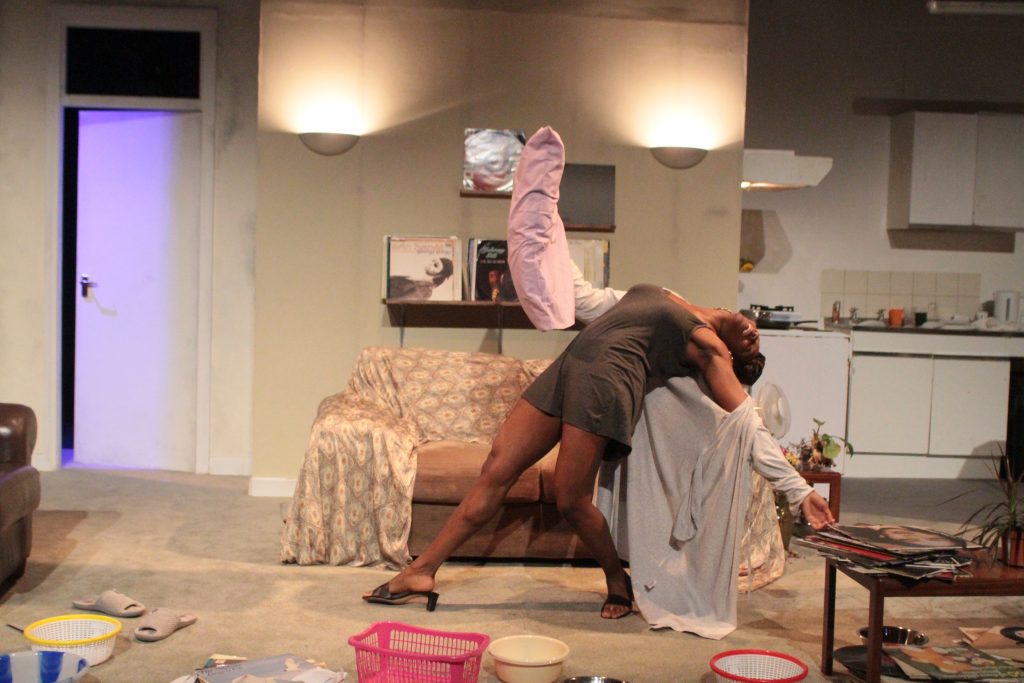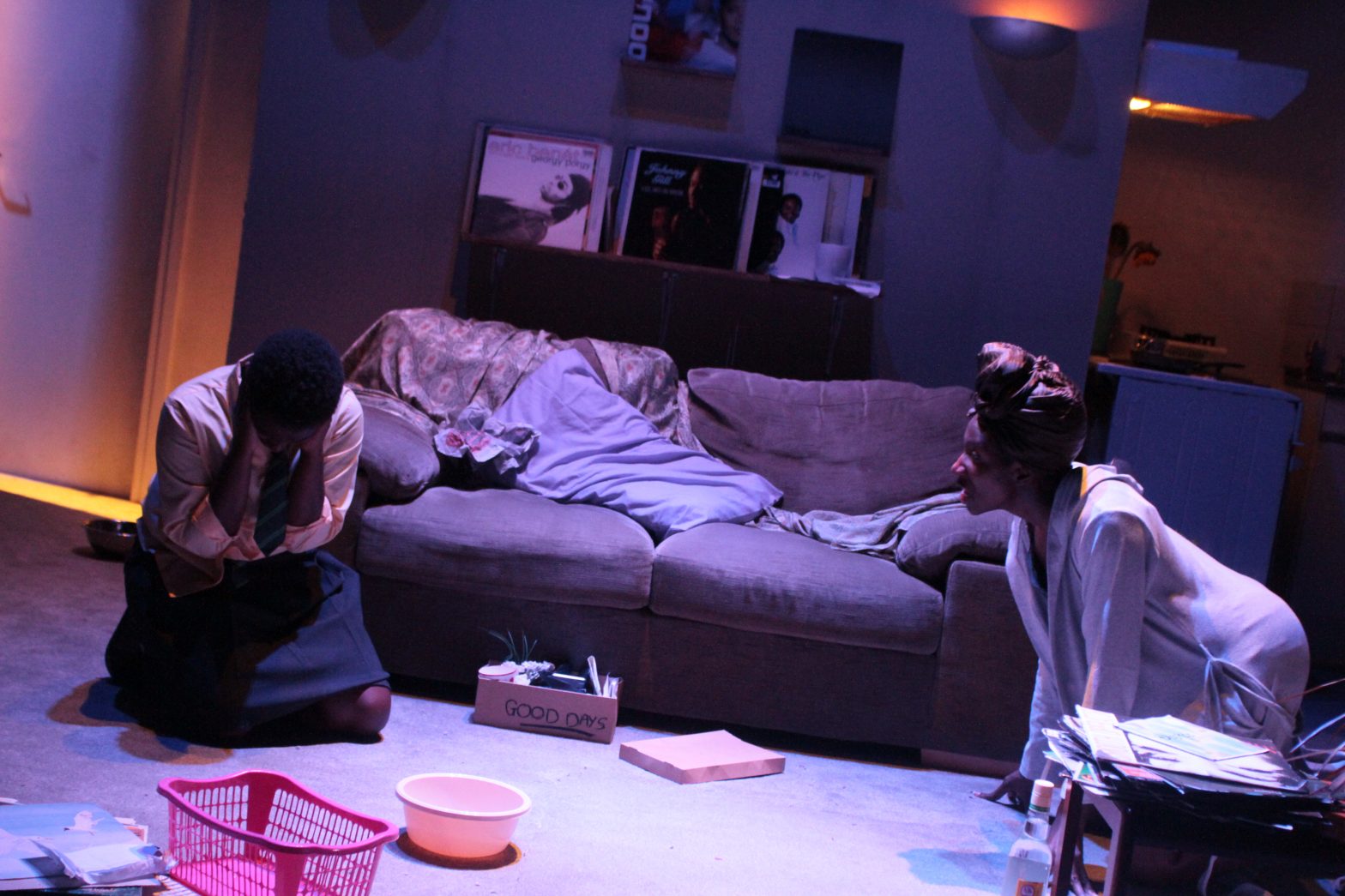This article is part of a mini-season celebrating the return of Black femme theatre.
When I ask babirye bukilwa to tell me about their career to date, they protest. “My career from the beginning? From the beginning is really boring. It’s actually not interesting and I don’t want to waste your time.”
They are, perhaps, thinking about their first paid job; a significant time in the life of a creative artist but admittedly those stories are indeed often boring. I am more interested in the point of genesis, the moment at which bukilwa realised they needed to create art. They remember their birth mother being really depressed when they were young. “I don’t know how [the music] made her feel but I was very aware that she connected with art and music when she was that way,” they explain. “And so I realised that when I would sing along she would like it, and so [performing] became about making sure she wasn’t sad. I didn’t have the language for it but I was like, ‘when I do this thing she is kind of happy.’ And so she encouraged me to do it – it was transactional.”
If you’ve seen …cake, this scene might seem familiar. Several versions of it can be seen throughout the performance, currently showing at Theatre Peckham in south London. It’s the tenderest display of filial love: Eshe and her mother Sissy, eyes locked, singing in perfect harmony to 90s hits including Sade’s Smooth Operator and You Gotta Be by Des’ree. Eshe smiles as she croons, she’s so pleased to see her mother’s happy reaction to her beautiful voice. But the smile is tentative. It’s impossible to fully enjoy the moment because she knows ones like this are fleeting; her mother is locked in the throes of a mental health episode that makes her behaviour unpredictable, erratic. As bukilwa continues to tell the story of their childhood into their formative years, the amount of detail recognisable from the play is a notable thing.
“If I could go back in time and give myself this play to read, would my life be any better or any richer? I feel like the answer would be yes.”
I ask if the story is autobiographical and bukilwa seems surprised – they genuinely hadn’t made a connection between Sissy and Eshe’s relationship and their relationship with their own mother in real life. “That’s really stressful,” they say when I point out the similarities. For them, the play is about where they learned how to lie. And how they learned how to lie because of the examples set by those around them. Perhaps I’ve imagined a connection where one does not exist. Or perhaps it is possible to accidentally write your memoir.
It’s definitely true that writing allows bukilwa space to ask questions. “If you want to write a play about cups then regardless of whatever metaphor or whatever it is, people will accept it as a play about cups. It’s safe. Whereas if you took those same thoughts to twitter or wrote an essay about it I don’t know how that would be perceived.” What they’re describing is a process of processing taking place through their work, in which generational trauma is a recurrent theme. “I don’t write plays for anyone else,” they say. “If I could go back in time and give myself this play to read, would my life be any better or any richer? I feel like the answer would be yes.”

…cake is the second instalment in a trilogy of psychological dramas written by bukilwa. The first, …blackbird hour, was shortlisted for three major playwriting awards last year: The Bruntwood Prize, The Women’s Prize For Playwriting, and the Alfred Fagon Award. Though they didn’t win any of them, bukilwa has taken positives from the experiences. “What I’ve learned from these things is that for those of us who are established playwrights – and I am not including myself in this – I think it’s a way of telling [the industry] that you’re still here. For those of us who aren’t established – and I’m projecting for me – it was about getting critique. And once I got that white validation, I thought, ‘oh I can see if I can just get more white validation’ and that was to see if I could get a play on.”
The pursuit of ‘white validation’ for bukilwa is an odd but necessary focus. They explain: “This industry is a white industry. This industry is owned and run by white people. This industry is elitist. This industry does fetishise and exploit Black work – and I’ve chosen to be a part of it. I can’t act as if I am existing in this vacuum where whiteness doesn’t encounter me and I’m not encountering it.”
“I’m very aware of how many boxes I tick, and I’m very aware of what communities I belong to, so often I’m trying to sift through what is genuine and what is not”
It’s difficult to believe – or perhaps understand how – bukilwa is still an emerging artist. Their career spans well over a decade and their CV boasts everything from productions at the most prestigious theatres in London and beyond, to critically acclaimed BBC comedy shows. They’ve performed in debbie tucker green plays, and alongside Cate Blanchett. They’ve written for radio and for stage both full length and short form, some of which has been nominated for awards. But they’re not in a rush to get bigger.
“The thing with being visible is that people don’t want to miss out on it. Your visibility to other people means that you can bring visibility to them. And I’m very aware of the intersections that I am, and I’m very aware of what I represent. And I’m very aware of how many boxes I tick, and I’m very aware of what communities I belong to, so often I’m trying to sift through what is genuine and what is not, and it’s really hard to discern that. Visibility without protection is a trap, and I’m not protected at the moment.” Money is top of the list of things bukilwa needs to feel protected. Closely followed by access, comfortability, and freedom of speech. “I don’t have those things,” they tell me. “And so whilst it’s lovely to be visible, the more visible I am, I have to discern who is for me and who is against me. And that is exhausting.”
Before we end the interview, I have one more question: what is the opposite of generational trauma? “Generational abundance, generational honesty, generational peace,” bukilwa replies. There’s a pensive pause before they wonder out loud if it’s possible, then answer their own question: “Yeah, I think it is. I think I have to believe it is. I write plays because I believe it is.”
…cake is showing at Theatre Peckham until 7th August. Get tickets.
Stay in touch. Subscribe to Skin Deep’s monthly newsletter.
